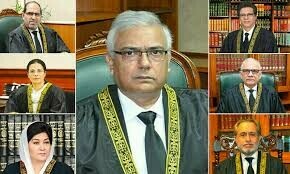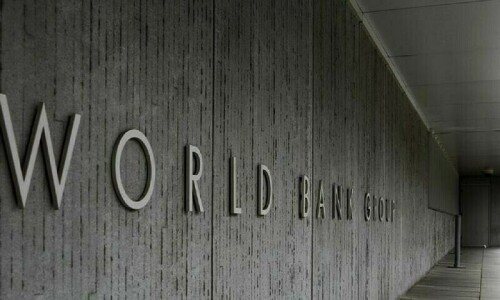A TAX-FREE, Covid-19–centric Rs1.2 trillion Sindh budget appears to be a relatively sensible and compassionate response to the current distressful situation, which is deepening the health challenge and compounding livelihood/food security risks.
However, the historical baggage of corruption, political biases and underperformance failed to rekindle hope or generate much goodwill, particularly in the business community.
Chief Minister Murad Ali Shah who also holds the finance portfolio was hardly audible during his speech in the Sindh Assembly as the opposition — Grand Democratic Alliance (GDA) and the PTI — hooted throughout the session. Besides the disruption induced by the pandemic, Mr Shah highlighted the threat to food security due to the locust attack over a vast area under cultivation in the province.
Current expenditures of Rs969.9 billion command almost 81 per cent of the total budget. About Rs39.2bn (3pc) is reserved for current capital expenditures while the remaining 16pc is earmarked for Rs232bn Annual Development Plan (ADP). In the current year, the focus of development efforts is on social services with about one-fifth or Rs44.5bn earmarked for health and education. The size of total development spending has been chopped by 19pc from last year citing the financial crunch.
The Sindh budget reinforces the perception that the status quo serves the ruling PPP well
The priority has been given to schemes nearing completion, especially in transport infrastructure and the provision of drinking water besides social protection, irrigation and the supply of affordable inputs for the agriculture sector.
To provide relief, Mr Shah proposed a salary increase of 10pc for government employees and a social protection and economic sustainability package of Rs34.2bn for the marginalised population bearing the brunt of the lockdown. An amount of Rs440 million has been set aside for locust control.
The Sindh budget, which was an opportunity for the ruling party to incrementally implement its economic vision, did not even mention the 2018 agriculture policy, business revival strategy or sustainable development goals (SDGs). If the budget had shown any progress on devolving power further down, it would have earned the PPP a high moral ground to wage a better fight against the federal government’s attempts to roll back the gains of the 18th Amendments and the 7th NFC Award.
Steps to check the pilferage of public funds are also missing from the budget. Some tangible measures aimed at moving towards a leaner and cleaner government would have earned the economic team the confidence of people other than the loyal mass base who are impressed with the handling of the Covid-19 crisis by Team Murad Ali Shah.
Despite acknowledging the need for better insight into economic growth drivers for effective interventions at multiple public forums, the subject of strengthening structures for tracing and tracking of the provincial economy did not get the attention of the budget makers.
This reinforced the perception that the ruling PPP does not wish to fiddle with the status quo that serves it well. Despite criticism, the mass rural base of the party is perceived by the leadership to be intact. The provincial bureaucratic hierarchy privately laments the state of affairs in Sindh run more on the whims of politicians than rules of business. Fearing a backlash, they keep their resentment to themselves as they watch the culture of patronage at play.
Currently, the provincial team is preoccupied with the daunting challenge of containing the pandemic and fixing the rickety health infrastructure. But the long overdue focus on the above-mentioned subjects could have supplemented their efforts.
Some enlightened members of the chief minister’s team tried to make necessary adjustments for better outcomes, but the top leadership is said to be risk-averse. It actively opposes anything radical that in its mind can trigger a domino effect and weaken its hold on its last bastion of political power — Sindh.
Haroon Farooki, former president of the Karachi Chamber of Commerce and Industry (KCCI), saw the budgets in the current uncertain environment with both unclear revenue and spending estimates more of an exercise to meet the constitutional requirement.
“We need to peek into the mindset of the provincial leadership that is geared to anything but serving the business interests. It is not without a reason that the business community detests the ruling party in Sindh. Is there anything for Karachi in the budget? Sadly, we are made to pay for the political friction between Sindh and the federal government,” he said.
Syed Asad Ali Shah, who runs a private company and sits on multiple boards, was also not too happy and termed Sindh budget unrealistic. “Receipts from the federal government are overestimated along with the projections of expected revenue generated from service tax in Sindh. The government should have explored alternative avenues to raise funds. The budget also lacks a game plan to revive and rehabilitate the provincial economy,” he said.
Dr Nadeem Javed, former chief economist Planning Commission found the pattern of Sindh budget comparatively stable. In his view more than the ‘will’ the issue in Sindh is that of ‘capacity’ to implement the budgetary measures.
“Sindh had been at the forefront of designing and implementing policies to deal with Covid-19. In the wake of a premature lifting of the lockdown under court orders, it slowly lost the initial gains and is now struggling with the fallout. If you compare the Sindh budget with the federal budget, it clearly better corresponds to the reality,” commented a former economic adviser to the Sindh government.
“With no available data on provincial GDP or the share of key sectors, one has no option but to carry on creatively, rehashing the old template year after year. There is no incentive to experiment with innovative ideas. When the rule of thumb to succeed is to appease the powers that be, why would anyone care about anything else?” said an insider.
Published in Dawn, The Business and Finance Weekly, June 22nd, 2020















































